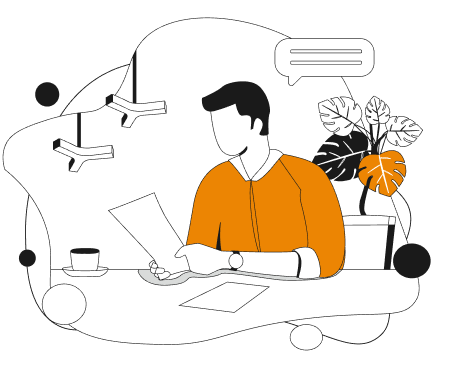
AI and automation are rapidly transforming industries by reshaping business operations and redefining the workforce. As AI technology continues to advance, the ways in which businesses interact with consumers and manage internal processes are evolving. This shift is creating a new ‘hybrid workforce’ where AI handles data collection and other routine tasks, allowing employees to focus on decision-making and higher-value activities.
According to PwC’s Global Artificial Intelligence Study, AI could contribute up to $15.7 trillion to the global economy by 2030. This blog explores the top industries impacted by AI and how these changes are affecting the workforce.
Manufacturing: A Future Fueled by AI
The manufacturing sector is undergoing a significant transformation due to AI and automation. These technologies are being used to reduce unplanned downtime, improve product quality, and enhance employee safety. AI-driven analytics help manufacturers predict and prevent equipment failures, leading to better asset utilization and increased productivity.
For instance, AI engines can identify the root causes of yield losses and suggest solutions to enhance production efficiency. Additionally, collaborative robots, or “cobots,” are assisting human workers with complex tasks, making manufacturing processes more efficient.
However, the adoption of AI in manufacturing also demands a skilled workforce capable of programming and maintaining these advanced systems. Reskilling and upskilling are crucial to ensure that employees can work alongside AI technologies effectively.
Retail: Revolutionizing the Shopping Experience
AI and automation are revolutionizing the retail industry by transforming how businesses interact with customers and manage their supply chains. Retailers are increasingly using AI to create personalized shopping experiences, such as Nike’s system that allows customers to design and purchase custom shoes in-store.
In addition to enhancing customer experiences, AI is also improving operational efficiency. For example, intelligent automation is being used in supply chain planning, helping retailers predict demand and optimize inventory management. This shift towards AI-driven processes is resulting in leaner, more agile organizations that can respond quickly to market changes.
AI-powered chatbots are also becoming a standard feature in retail, providing instant customer support and guiding shoppers through their buying journey. As AI continues to evolve, it will play an even greater role in shaping the future of retail.
Real Estate: Enhancing the Home-Buying Process
The real estate industry is another sector where AI is making a significant impact. AI-enabled home search portals are transforming the way consumers search for properties by providing personalized recommendations based on individual preferences and needs.
In addition to streamlining the home search process, AI is also being used to enhance the buying experience. For example, real estate startups like Zenplace are offering AI-based property tours, allowing customers to explore homes virtually. AI is also helping real estate agents by automating routine tasks, such as answering queries and scheduling viewings, enabling them to focus on more strategic activities.
The integration of AI in real estate is not only improving customer experiences but also increasing efficiency and accuracy in property valuation and market trend predictions.
Healthcare: Transforming Patient Care
AI is revolutionizing healthcare by enabling faster and more accurate diagnoses, improving patient outcomes, and addressing the shortage of healthcare providers. AI-powered tools like IDx-DR, which can diagnose diabetic retinopathy, are already being used in clinical settings.
In addition to diagnostics, AI is also being used to develop advanced radiology tools that may eventually eliminate the need for tissue samples in certain cases. Brain-computer interfaces (BCIs) powered by AI are helping restore neurological functions in patients who have suffered trauma.
AI’s ability to analyze vast amounts of medical data is also aiding in the development of new treatment protocols and personalized medicine. As AI continues to advance, it will play an increasingly vital role in healthcare, helping to bridge the gap in regions with limited access to medical professionals.
Emerging Opportunities in AI
As AI continues to transform industries, it is also creating new opportunities for professionals with the right skills. Companies are investing heavily in AI research and development, leading to the creation of new roles in areas such as AI software development, data mining, and machine learning applications.
Professionals looking to advance their careers in AI should consider pursuing specialized training and certifications. Industry-specific certifications can demonstrate expertise and make candidates more attractive to employers.
Educational programs, such as those offered in collaboration with leading institutions, provide the knowledge and skills needed to excel in AI and related fields. By staying ahead of the curve and acquiring the necessary skills, professionals can position themselves at the forefront of the AI revolution.
Want more details?
Watch the YouTube podcast for an engaging deep dive!
Find it : https://youtu.be/LUwT8xKlJxw?si=Is6IcdqUMT5whOJk
Contact Us
Are you ready to leverage AI and automation to transform your business? At Asambhav Solutions, we specialize in custom software development, including AI and automation solutions tailored to your needs. Our expertise in the MERN stack, web and app development, and generative AI applications ensures that your business stays ahead of the competition.
Let’s discuss how we can help you harness the power of AI to drive innovation and growth in your industry.
Talk soon!
Shreyan Mehta
Founder, Asambhav Solutions.


